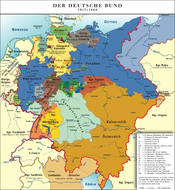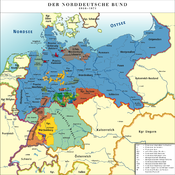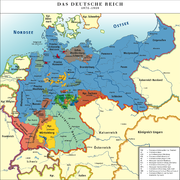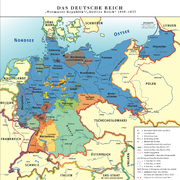
Historic states of Germany
Encyclopedia
This article lists the member states of the German Confederation
of 1815-1866, the North German Confederation
of 1866-1871 which became a federal empire in 1867, the German Empire
of 1871-1918, and lastly the republic of Weimar Germany of 1919-1933.
States of the German Confederation
 List of member states:
List of member states:
States of the North German Confederation
 List of the member states:
List of the member states:
States of the German Empire
 List of the imperial states:
List of the imperial states:
 List of the free states:
List of the free states:
German Confederation
The German Confederation was the loose association of Central European states created by the Congress of Vienna in 1815 to coordinate the economies of separate German-speaking countries. It acted as a buffer between the powerful states of Austria and Prussia...
of 1815-1866, the North German Confederation
North German Confederation
The North German Confederation 1866–71, was a federation of 22 independent states of northern Germany. It was formed by a constitution accepted by the member states in 1867 and controlled military and foreign policy. It included the new Reichstag, a parliament elected by universal manhood...
of 1866-1871 which became a federal empire in 1867, the German Empire
German Empire
The German Empire refers to Germany during the "Second Reich" period from the unification of Germany and proclamation of Wilhelm I as German Emperor on 18 January 1871, to 1918, when it became a federal republic after defeat in World War I and the abdication of the Emperor, Wilhelm II.The German...
of 1871-1918, and lastly the republic of Weimar Germany of 1919-1933.
States of the German ConfederationGerman ConfederationThe German Confederation was the loose association of Central European states created by the Congress of Vienna in 1815 to coordinate the economies of separate German-speaking countries. It acted as a buffer between the powerful states of Austria and Prussia...

- 1. Austrian EmpireAustrian EmpireThe Austrian Empire was a modern era successor empire, which was centered on what is today's Austria and which officially lasted from 1804 to 1867. It was followed by the Empire of Austria-Hungary, whose proclamation was a diplomatic move that elevated Hungary's status within the Austrian Empire...
(only including Bohemia-Moravia, Austria and most of Slovenia) - 2. Kingdom of PrussiaKingdom of PrussiaThe Kingdom of Prussia was a German kingdom from 1701 to 1918. Until the defeat of Germany in World War I, it comprised almost two-thirds of the area of the German Empire...
(excluding provinces East Prussia, West Prussia and Posen) - 3. Kingdom of BavariaKingdom of BavariaThe Kingdom of Bavaria was a German state that existed from 1806 to 1918. The Bavarian Elector Maximilian IV Joseph of the House of Wittelsbach became the first King of Bavaria in 1806 as Maximilian I Joseph. The monarchy would remain held by the Wittelsbachs until the kingdom's dissolution in 1918...
- 4. Kingdom of HanoverKingdom of HanoverThe Kingdom of Hanover was established in October 1814 by the Congress of Vienna, with the restoration of George III to his Hanoverian territories after the Napoleonic era. It succeeded the former Electorate of Brunswick-Lüneburg , and joined with 38 other sovereign states in the German...
- 5. Kingdom of SaxonyKingdom of SaxonyThe Kingdom of Saxony , lasting between 1806 and 1918, was an independent member of a number of historical confederacies in Napoleonic through post-Napoleonic Germany. From 1871 it was part of the German Empire. It became a Free state in the era of Weimar Republic in 1918 after the end of World War...
- 6. Kingdom of WürttembergKingdom of WürttembergThe Kingdom of Württemberg was a state that existed from 1806 to 1918, located in present-day Baden-Württemberg, Germany. It was a continuation of the Duchy of Württemberg, which came into existence in 1495...
- 7. Grand Duchy of BadenGrand Duchy of BadenThe Grand Duchy of Baden was a historical state in the southwest of Germany, on the east bank of the Rhine. It existed between 1806 and 1918.-History:...
- 8. Grand Duchy of HesseGrand Duchy of HesseThe Grand Duchy of Hesse and by Rhine , or, between 1806 and 1816, Grand Duchy of Hesse —as it was also known after 1816—was a member state of the German Confederation from 1806, when the Landgraviate of Hesse-Darmstadt was elevated to a Grand Duchy, until 1918, when all the German...
- 9. Grand Duchy of Luxembourg (in personal unionPersonal unionA personal union is the combination by which two or more different states have the same monarch while their boundaries, their laws and their interests remain distinct. It should not be confused with a federation which is internationally considered a single state...
with the United Netherlands, independent since 1839 losing half of its territory in the process) - 10. Grand Duchy of Mecklenburg-Schwerin
- 11. Grand Duchy of Mecklenburg-Strelitz
- 12. Grand Duchy of Oldenburg (upgrade from duchy in 1829)
- 13. Grand Duchy of Saxe-Weimar-Eisenach
- 14. Duchy of Anhalt (since 1863)
- 15. Duchy of Anhalt-DessauAnhalt-DessauAnhalt-Dessau was a principality and later a duchy located in Germany. It was created in 1396 following the partition of the Principality of Anhalt-Zerbst. The capital of the state was Dessau. Anhalt-Dessau experienced a number of partitions throughout its existence with Anhalt-Köthen being...
(until 1863) - 16. Duchy of Anhalt-BernburgAnhalt-BernburgAnhalt-Bernburg was a principality of the Holy Roman Empire and a duchy of the German Confederation ruled by the House of Ascania with its residence at Bernburg in present-day Saxony-Anhalt...
(until 1863) - 17. Duchy of Anhalt-KöthenAnhalt-KöthenAnhalt-Köthen has existed on two separate occasions. The first state was created in 1396 when the Anhalt-Zerbst was partitioned between Anhalt-Dessau and Anhalt-Köthen. The first creation lasted until 1552 when it was inherited by Anhalt-Dessau....
(until 1847 when it merged with Anhalt-Dessau) - 18. Duchy of BrunswickDuchy of BrunswickBrunswick was a historical state in Germany. Originally the territory of Brunswick-Wolfenbüttel in the Holy Roman Empire, it was established as an independent duchy by the Congress of Vienna in 1815...
- 19. Duchy of Holstein (in personal union with the Kingdom of Denmark until 1864 and attached to the Duchy of Schleswig under confederal occupation since 1864)
- 20. Duchy of LimburgDuchy of LimburgThe Duchy of Limburg, situated in the Low Countries between the river Meuse and the city of Aachen, was a state of the Holy Roman Empire. Its territory is now divided between the Belgian provinces of Liège and Limburg , the Dutch province of Limburg , and a small part of North Rhine-Westphalia in...
(part of the Netherlands, member since 1839) - 21. Duchy of Nassau
- 22. Duchy of Saxe-Gotha-AltenburgSaxe-Gotha-AltenburgSaxe-Gotha-Altenburg was a duchy ruled by the Ernestine branch of the House of Wettin in today's Thuringia, Germany.It was nominally created in 1672 when Frederick William III, the last duke of Saxe-Altenburg, died and Ernest I, Duke of Saxe-Gotha , inherited the major part of his possessions...
(until 1825) - 23. Duchy of Saxe-Coburg-SaalfeldSaxe-Coburg-SaalfeldThe Duchy of Saxe-Coburg-Saalfeld was one of the Saxon Duchies held by the Ernestine line of the Wettin Dynasty. Established in the 17th century, the Saxe-Coburg-Saalfield line lasted until the reshuffle of Ernestine territories that occurred following the extinction of the Saxe-Gotha line in...
(until 1825) - 24. Duchy of Saxe-HildburghausenSaxe-HildburghausenSaxe-Hildburghausen was an Ernestine duchy in what is now southern Thuringia, Germany. Its territory was similar to that of the modern Hildburghausen district.-History:...
(Saxe-Altenburg since 1826) - 25. Duchy of Saxe-Coburg-GothaSaxe-Coburg and GothaSaxe-Coburg and Gotha or Saxe-Coburg-Gotha served as the collective name of two duchies, Saxe-Coburg and Saxe-Gotha, in Germany. They were located in what today are the states of Bavaria and Thuringia, respectively, and the two were in personal union between 1826 and 1918...
(since 1826) - 26. Duchy of Saxe-Lauenburg (in personal union with Denmark till 1864, with Prussian since 1865)
- 27. Duchy of Saxe-MeiningenSaxe-MeiningenThe Duchy of Saxe-Meiningen was one of the Saxon duchies held by the Ernestine line of the Wettin dynasty, located in the southwest of the present-day German state of Thuringia....
- 28. Landgraviate of Hesse-Kassel
- 29. Landgraviate of Hesse-Homburg (member since 1817)
- 30. Principality of LichtenbergPrincipality of LichtenbergThe Principality of Lichtenberg was a small state of the German Confederation owned by a branch of the Saxe-Coburgs which was sold to Prussia and incorporated into the Rhine Province in 1834...
(sold to Prussia 1834) - 31. Principality of Hohenzollern-HechingenHohenzollern-HechingenHohenzollern-Hechingen was a county and principality in southwestern Germany. Its rulers belonged to a branch of the senior Swabian branch of the Hohenzollern dynasty.-History:...
(annexed by Prussia 1849) - 32. Principality of Hohenzollern-SigmaringenHohenzollern-Sigmaringen-Noble jurisdictions:Prince Karl Eitel of Hohenzollern-Sigmaringen, and descendants of his nephew Ferdinand ruled over the Kingdom of Romania, as Karl Eitel did not have children...
(annexed by Prussia 1849) - 33. Principality of Liechtenstein
- 34. Principality of LippePrincipality of LippeLippe was a historical state in Germany. It was located between the Weser River and the southeast part of the Teutoburg forest.-History:...
- 35. Principality of Reuss, senior lineReuss Elder LineThe Principality of Reuss Elder Line was a state in Germany, ruled by members of the House of Reuss. The Counts Reuss of Greiz, Lower- and Upper Greiz , were elevated to princely status in 1778. Its members bore the title Prince Reuss, Elder Line, or Prince Reuss of Greiz...
- 36. Principality of Reuss, junior line
- 37. Principality of Schaumburg-Lippe
- 38. Principality of Schwarzburg-Rudolstadt
- 39. Principality of Schwarzburg-Sondershausen
- 40. Principality of Waldeck-Pyrmont
- 41. Free City of Bremen
- 42. Free City of FrankfurtFree City of FrankfurtFor almost five centuries, the German city of Frankfurt am Main was a city-state within two major Germanic states:*The Holy Roman Empire as the Free Imperial City of Frankfurt...
- 43. Free City of Hamburg
- 44. Free City of Lübeck
States of the North German ConfederationNorth German ConfederationThe North German Confederation 1866–71, was a federation of 22 independent states of northern Germany. It was formed by a constitution accepted by the member states in 1867 and controlled military and foreign policy. It included the new Reichstag, a parliament elected by universal manhood...

- 1. Kingdom of PrussiaKingdom of PrussiaThe Kingdom of Prussia was a German kingdom from 1701 to 1918. Until the defeat of Germany in World War I, it comprised almost two-thirds of the area of the German Empire...
- 2. Kingdom of SaxonyKingdom of SaxonyThe Kingdom of Saxony , lasting between 1806 and 1918, was an independent member of a number of historical confederacies in Napoleonic through post-Napoleonic Germany. From 1871 it was part of the German Empire. It became a Free state in the era of Weimar Republic in 1918 after the end of World War...
- 3. Grand Duchy of HesseGrand Duchy of HesseThe Grand Duchy of Hesse and by Rhine , or, between 1806 and 1816, Grand Duchy of Hesse —as it was also known after 1816—was a member state of the German Confederation from 1806, when the Landgraviate of Hesse-Darmstadt was elevated to a Grand Duchy, until 1918, when all the German...
(only Upper Hesse) - 4. Grand Duchy of Mecklenburg-Schwerin
- 5. Grand Duchy of Mecklenburg-Strelitz
- 6. Grand Duchy of Oldenburg
- 7. Grand Duchy of Saxe-Weimar-Eisenach
- 8. Duchy of Anhalt
- 9. Duchy of BrunswickDuchy of BrunswickBrunswick was a historical state in Germany. Originally the territory of Brunswick-Wolfenbüttel in the Holy Roman Empire, it was established as an independent duchy by the Congress of Vienna in 1815...
- 10. Duchy of Saxe-Altenburg
- 11. Duchy of Saxe-Coburg and Gotha
- 12. Duchy of Saxe-LauenburgDuchy of Saxe-LauenburgThe Duchy of Saxe-Lauenburg between the 14th and 17th centuries), later also known as the Duchy of Lauenburg, was a reichsfrei duchy that existed 1296–1803 and 1814–1876 in the extreme southeast region of what is now Schleswig-Holstein...
(in personal unionPersonal unionA personal union is the combination by which two or more different states have the same monarch while their boundaries, their laws and their interests remain distinct. It should not be confused with a federation which is internationally considered a single state...
with Prussia) - 13. Duchy of Saxe-Meiningen
- 14. Principality of LippePrincipality of LippeLippe was a historical state in Germany. It was located between the Weser River and the southeast part of the Teutoburg forest.-History:...
- 15. Principality of Reuss, senior lineReuss Elder LineThe Principality of Reuss Elder Line was a state in Germany, ruled by members of the House of Reuss. The Counts Reuss of Greiz, Lower- and Upper Greiz , were elevated to princely status in 1778. Its members bore the title Prince Reuss, Elder Line, or Prince Reuss of Greiz...
- 16. Principality of Reuss, junior line
- 17. Principality of Schaumburg-Lippe
- 18. Principality of Schwarzburg-Rudolstadt
- 19. Principality of Schwarzburg-Sondershausen
- 20. Principality of Waldeck-Pyrmont
- 21. Free City of Bremen
- 22. Free City of Hamburg
- 23. Free City of Lübeck
States of the German EmpireGerman EmpireThe German Empire refers to Germany during the "Second Reich" period from the unification of Germany and proclamation of Wilhelm I as German Emperor on 18 January 1871, to 1918, when it became a federal republic after defeat in World War I and the abdication of the Emperor, Wilhelm II.The German...

- 1. Kingdom of PrussiaKingdom of PrussiaThe Kingdom of Prussia was a German kingdom from 1701 to 1918. Until the defeat of Germany in World War I, it comprised almost two-thirds of the area of the German Empire...
- 2. Kingdom of BavariaKingdom of BavariaThe Kingdom of Bavaria was a German state that existed from 1806 to 1918. The Bavarian Elector Maximilian IV Joseph of the House of Wittelsbach became the first King of Bavaria in 1806 as Maximilian I Joseph. The monarchy would remain held by the Wittelsbachs until the kingdom's dissolution in 1918...
- 3. Kingdom of SaxonyKingdom of SaxonyThe Kingdom of Saxony , lasting between 1806 and 1918, was an independent member of a number of historical confederacies in Napoleonic through post-Napoleonic Germany. From 1871 it was part of the German Empire. It became a Free state in the era of Weimar Republic in 1918 after the end of World War...
- 4. Kingdom of WürttembergKingdom of WürttembergThe Kingdom of Württemberg was a state that existed from 1806 to 1918, located in present-day Baden-Württemberg, Germany. It was a continuation of the Duchy of Württemberg, which came into existence in 1495...
- 5. Grand Duchy of BadenGrand Duchy of BadenThe Grand Duchy of Baden was a historical state in the southwest of Germany, on the east bank of the Rhine. It existed between 1806 and 1918.-History:...
- 6. Grand Duchy of HesseGrand Duchy of HesseThe Grand Duchy of Hesse and by Rhine , or, between 1806 and 1816, Grand Duchy of Hesse —as it was also known after 1816—was a member state of the German Confederation from 1806, when the Landgraviate of Hesse-Darmstadt was elevated to a Grand Duchy, until 1918, when all the German...
- 7. Grand Duchy of Mecklenburg-Schwerin
- 8. Grand Duchy of Mecklenburg-Strelitz
- 9. Grand Duchy of Oldenburg
- 10. Grand Duchy of Saxe-Weimar-Eisenach
- 11. Duchy of Anhalt
- 12. Duchy of BrunswickDuchy of BrunswickBrunswick was a historical state in Germany. Originally the territory of Brunswick-Wolfenbüttel in the Holy Roman Empire, it was established as an independent duchy by the Congress of Vienna in 1815...
- 13. Duchy of Saxe-Altenburg
- 14. Duchy of Saxe-Coburg and Gotha
- 15. Duchy of Saxe-LauenburgDuchy of Saxe-LauenburgThe Duchy of Saxe-Lauenburg between the 14th and 17th centuries), later also known as the Duchy of Lauenburg, was a reichsfrei duchy that existed 1296–1803 and 1814–1876 in the extreme southeast region of what is now Schleswig-Holstein...
(merged into Prussia on 1 July 1876) - 16. Duchy of Saxe-Meiningen
- 17. Principality of LippePrincipality of LippeLippe was a historical state in Germany. It was located between the Weser River and the southeast part of the Teutoburg forest.-History:...
- 18. Principality of Reuss, senior lineReuss Elder LineThe Principality of Reuss Elder Line was a state in Germany, ruled by members of the House of Reuss. The Counts Reuss of Greiz, Lower- and Upper Greiz , were elevated to princely status in 1778. Its members bore the title Prince Reuss, Elder Line, or Prince Reuss of Greiz...
- 19. Principality of Reuss, junior line
- 20. Principality of Schaumburg-Lippe
- 21. Principality of Schwarzburg-Rudolstadt
- 22. Principality of Schwarzburg-Sondershausen
- 23. Principality of Waldeck-Pyrmont
- 24. Free City of Bremen
- 25. Free City of Hamburg
- 26. Free City of Lübeck
- 27. Territory of Alsace-LorraineAlsace-LorraineThe Imperial Territory of Alsace-Lorraine was a territory created by the German Empire in 1871 after it annexed most of Alsace and the Moselle region of Lorraine following its victory in the Franco-Prussian War. The Alsatian part lay in the Rhine Valley on the west bank of the Rhine River and east...
States of Weimar Germany

- 1. Free State of Prussia
- 2. Free State of Bavaria
- 3. Free State of Saxony
- 4. Free State of WürttembergFree People's State of WürttembergThe Free People's State of Württemberg was a state of Germany during the Weimar Republic in Württemberg.-1918 revolution:As Germany underwent violent revolution near the end of World War I, the Kingdom of Württemberg was transformed from a monarchy to a democratic republic without bloodshed; its...
- 5. Free State of Hesse
- 6. Free State of BadenRepublic of BadenThe Republic of Baden was a state of Germany during the time of the Weimar Republic, formed after the abolition of the Grand Duchy of Baden in 1918...
- 7. Free State of Mecklenburg-SchwerinFree State of Mecklenburg-SchwerinThe Free State of Mecklenburg-Schwerin was a state in the Weimar Republic that was established in 1918 following the abdication of the Grand Duke of Mecklenburg-Schwerin following the German Revolution...
- 8. Free State of Mecklenburg-StrelitzFree State of Mecklenburg-StrelitzThe Free State of Mecklenburg-Strelitz was a state of the Weimar Republic established in 1918 following the German Revolution which had overthrown the Grand Duke of Mecklenburg-Strelitz...
- 9. Free State of OldenburgFree State of OldenburgThe Free State of Oldenburg was a state of the Weimar Republic. It was established in 1918 following the abdication of the Grand Duke Frederick Augustus II following the German Revolution....
- 10. Free State of AnhaltFree State of AnhaltThe Free State of Anhalt was formed after Joachim Ernst, Duke of Anhalt abdicated on 12 November 1918, ending the Duchy of Anhalt. It was a state of Germany during the time of the Weimar Republic...
- 11. Free State of BrunswickFree State of BrunswickThe Free State of Brunswick was the republic formed after the abolition of the Duchy of Brunswick in the course of the German Revolution of 1918–19. It was a state of the German Reich in the time of the Weimar Republic and Nazi Germany.-History:...
- 12. Free State of LippeFree State of LippeThe Free State of Lippe was a German state formed after the Principality of Lippe was abolished following the German Revolution of 1918.After the end of World War II, Lippe was restored from Nazi rule. This autonomy ended in January 1947 when British forces incorporated Lippe into the new German...
- 13. Free State of Schaumburg-LippeFree State of Schaumburg-LippeThe Free State of Schaumburg-Lippe was created following the abdication of Prince Adolf II of Schaumburg-Lippe on 15 November 1918. It was a state in Germany during the Weimar Republic, headed by a Minister President. The democratic government was suppressed during Nazi rule...
- 14. Free State of Waldeck(-Pyrmont)Free State of Waldeck-PyrmontThe Free State of Waldeck-Pyrmont and later the Free State of Waldeck was a constituent state of the Weimar Republic. It was created following the German Revolution which forced Prince Friedrich of Waldeck and Pyrmont along with the other German monarchs to abdicate.On 30 November 1921, following a...
(ceded exclave Pyrmont in 1921, merged with Prussia in 1929) - 15. Free State of Thuringia (since 1920, created from the Thuringia states)
- 16. State of Saxe-Weimar-EisenachThuringiaThe Free State of Thuringia is a state of Germany, located in the central part of the country.It has an area of and 2.29 million inhabitants, making it the sixth smallest by area and the fifth smallest by population of Germany's sixteen states....
(merged to create Thuringia) - 17. State of Saxe-AltenburgThuringiaThe Free State of Thuringia is a state of Germany, located in the central part of the country.It has an area of and 2.29 million inhabitants, making it the sixth smallest by area and the fifth smallest by population of Germany's sixteen states....
(merged to create Thuringia) - 18. State of Saxe-GothaThuringiaThe Free State of Thuringia is a state of Germany, located in the central part of the country.It has an area of and 2.29 million inhabitants, making it the sixth smallest by area and the fifth smallest by population of Germany's sixteen states....
(merged to create Thuringia) - 19. State of Saxe-CoburgBavariaBavaria, formally the Free State of Bavaria is a state of Germany, located in the southeast of Germany. With an area of , it is the largest state by area, forming almost 20% of the total land area of Germany...
(merged with Bavaria 1920) - 20. State of Saxe-MeiningenThuringiaThe Free State of Thuringia is a state of Germany, located in the central part of the country.It has an area of and 2.29 million inhabitants, making it the sixth smallest by area and the fifth smallest by population of Germany's sixteen states....
(merged to create Thuringia) - 21. State of Schwarzburg-RudolstadtThuringiaThe Free State of Thuringia is a state of Germany, located in the central part of the country.It has an area of and 2.29 million inhabitants, making it the sixth smallest by area and the fifth smallest by population of Germany's sixteen states....
(merged to create Thuringia) - 22. State of Schwarzburg-SondershausenThuringiaThe Free State of Thuringia is a state of Germany, located in the central part of the country.It has an area of and 2.29 million inhabitants, making it the sixth smallest by area and the fifth smallest by population of Germany's sixteen states....
(merged to create Thuringia) - 23. State of ReussThuringiaThe Free State of Thuringia is a state of Germany, located in the central part of the country.It has an area of and 2.29 million inhabitants, making it the sixth smallest by area and the fifth smallest by population of Germany's sixteen states....
(merged to create Thuringia) - 24. Free City of Bremen
- 25. Free City of Hamburg
- 26. Free City of Lübeck
See also
- List of former sovereign states
- List of historic states of Italy
- List of historic states of Russia

